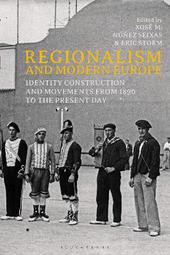
|
Regionalism and Modern Europe: Identity Construction and Movements from 1890 to the Present Day
Paperback / softback
Main Details
| Title |
Regionalism and Modern Europe: Identity Construction and Movements from 1890 to the Present Day
|
| Authors and Contributors |
Edited by Professor Xose M. Nunez Seixas
|
|
Edited by Eric Storm
|
| Physical Properties |
| Format:Paperback / softback | | Pages:384 | | Dimensions(mm): Height 234,Width 156 |
|
| ISBN/Barcode |
9781474275194
|
| Classifications | Dewey:320.54094 |
|---|
| Audience | | Professional & Vocational | |
|---|
| Illustrations |
7 Maps
|
|
Publishing Details |
| Publisher |
Bloomsbury Publishing PLC
|
| Imprint |
Bloomsbury Academic
|
| Publication Date |
13 December 2018 |
| Publication Country |
United Kingdom
|
Description
Providing a valuable overview of regionalism throughout the entire continent, Regionalism in Modern Europe combines both geographical and thematic approaches to examine the origins and development of regional movements and identities in Europe from 1890 to the present. A wide range of internationally renowned scholars from the USA, the UK and mainland Europe are brought together here in one volume to examine the historical roots of the current regional movements, and to explain why some of them - Scotland, Catalonia and Flanders, among others - evolve into nationalist movements and even strive for independence, while others - Brittany, Bavaria - do not. They look at how regional identities - through regional folklore, language, crafts, dishes, beverages and tourist attractions - were constructed during the 20th century and explore the relationship between national and subnational identities, as well as regional and local identities. The book also includes 7 images, 7 maps and useful end-of-chapter further reading lists. This is a crucial text for anyone keen to know more about the history of the topical - and at times controversial - subject of regionalism in modern Europe.
Author Biography
Xose M. Nunez Seixas is Professor of Modern European History at the University of Santiago de Compostela, Spain. He has published widely on the comparative history of nationalist movements and national and regional identities. He has co-edited, along with Javier Moreno, Metaphors of Spain: Representations of Spanish National Identity in the Twentieth Century (2017). Eric Storm is Senior Lecturer in European History at Leiden University, The Netherlands. He is the author of The Culture of Regionalism: Art, Architecture and International Exhibitions in France, Germany and Spain, 1890-1939 (2010). He is also the co-editor, along with Joost Augusteijn, of Region and State in Nineteenth-Century Europe: Nation-Building, Regional Identities and Separatism (2012).
ReviewsA comprehensive view of regionalism, an important but often under-the-radar phenomenon in modern times. Well-written, engaging and filled with fascinating detail, this is a book that all historians of Europe should read. It brings nuance and new perspectives to almost every subject that scholars of Europe have long studied. * Celia Applegate, William R. Kenan, Jr. Professor of History, Vanderbilt University, USA * A nation (state) is a region with an army? What is the difference between nation and region and between nationalism and regionalism? How are regions constructed? Are regionalisms necessarily more benign than nationalisms? This volume provides cogent answers to these and other questions and does so in a wonderfully broad European scope covering many key themes in regionalism studies. A must-read for anyone interested in the study of European regionalism. * Stefan Berger, Professor of Social History and Director of the Institute of Social Movements and the House for the History of the Ruhr, Ruhr University Bochum, Germany * This comprehensive and well-structured volume is a must read for anybody interested in the political, social and cultural history of regionalism in Europe. By covering all parts of Europe from North to South and West to East, it also greatly advances the state of research in comparative nationalism studies. The volume studies regionalism from various disciplinary angles, from below and from above, from the Left and the Right, and it shows that regional movements have been a pillar of democracy. * Philipp Ther, Professor of Central European History and Director of the Institute of East European History at the University of Vienna, Austria *
|